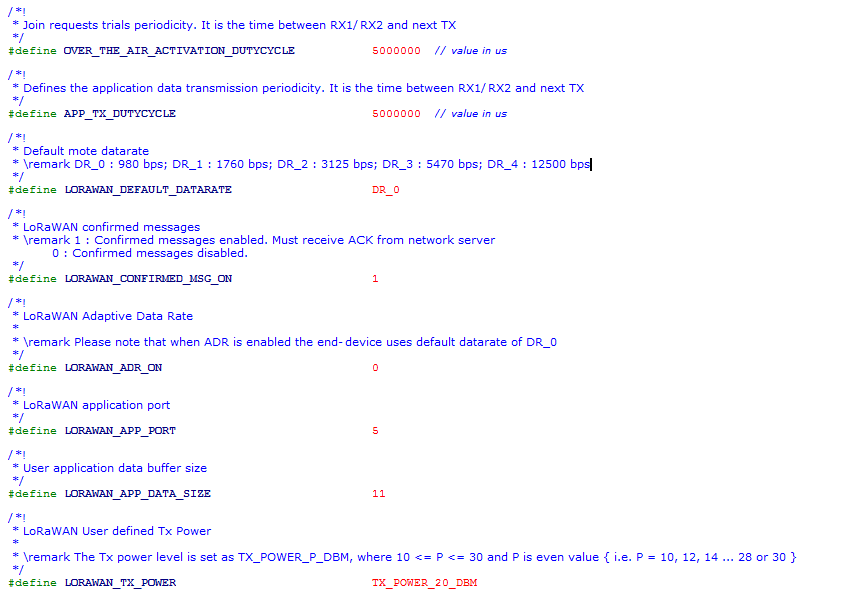SX1276 Shield based Applications
Dependencies: X_NUCLEO_IKS01A1 LoRaWAN-lib SX1276Lib mbed
LoRaWAN-SX1276-Application Demo uses SX1276MB1LAS mbed component shield on a nucleo board platform to demonstrate a Class-A LoRaWAN device in the 915MHz ISM band for North American region. It uses the LoRaWAN-lib and SX1276Lib libraries.
Comissioning.h (LoRaWAN Network Configuration)
The end-device can be activated in one of the two ways:
Over the Air (OTA) activation can be enabled as shown in the figure below.

The end-device must be configured with the following parameters:
LORAWAN_DEVICE_EUI(8 Bytes) : Fist 3 Bytes is the Organizationally Unique Identifier (OUI) followed by 5 bytes of unique ID. If not defined by user, then the firmware automatically assigns one to the end-deviceLORAWAN_APPLICATION_EUI(8 Bytes)LORAWAN_APPLICATION_KEY(or DEVKEY) (16 Bytes)

Activation by Personalization (ABP) can be enabled as shown in the figure below.

The end-device must be configured with the following parameters:
LORAWAN_DEVICE_ADDRESS(4 Bytes) : If not defined by user, then the firmware automatically assigns one to the end-deviceLORAWAN_NWKSKEY(16 Bytes)LORAWAN_APPSKEY(16 Bytes)

Config.h (LoRaWAN Communication Parameters)
- Mode of Operation : Hybrid
If the end-device needs to be configured to operate over 8-channels, then
Hybrid Modeneeds to be enabled
- Mode of Operation : Frequency Hop
If the end-device needs to be configured to operate over 64-channels, then
Hybrid Modeneeds to be disabled
- Delay between successive JOIN REQUESTs :
The delay between successive Join Requests (until the end-device joins the network) can be configured using the parameter
OVER_THE_AIR_ACTIVATION_DUTYCYCLE
- Inter-Frame Delay :
One can change the delay between each frame transmission using
APP_TX_DUTYCYCLEIt is advisable thatAPP_TX_DUTYCYCLEis greater than or equal to 3sec.
- Data Rate :
The data rate can be configured as per LoRaWAN specification using the paramter
LORAWAN_DEFAULT_DATARATE. The range of values are DR_0, DR_1, DR_2, DR_3 and DR_4
- Confirmed/Unconfirmed Messages :
The uplink message or payload can be chosen to be confirmed or unconfirmed using the parameter
LORAWAN_CONFIRMED_MSG_ON. When set to 1, the transmitted messages need to be confirmed with anACKby the network server in the subsequent RX window. When set to 0, noACKis requested.
- ADR ON/OFF :
The ADR can be enabled or disabled using the parameter
LORAWAN_ADR_ON. When set to 1, ADR is enabled and disabled when set to 0.
- Application Port :
The application port can be set using parameter
LORAWAN_APP_PORT. A few examples are associated to specific Application Port, and are defined in Config.h
- Payload Length :
The lenght of the payload (in bytes) to be transmitted can be configured using
LORAWAN_APP_DATA_SIZE
- Transmit Power :
The transmit power can be configured using
LORAWAN_TX_POWER(LoRaMAC verifies if the set power is compliant with the LoRaWAN spec and FCC guidelines)

The baud-rate for serial terminal display is 115200
system/timer.h
- Committer:
- ubhat
- Date:
- 2016-08-26
- Revision:
- 0:42863a11464a
File content as of revision 0:42863a11464a:
/*
/ _____) _ | |
( (____ _____ ____ _| |_ _____ ____| |__
\____ \| ___ | (_ _) ___ |/ ___) _ \
_____) ) ____| | | || |_| ____( (___| | | |
(______/|_____)_|_|_| \__)_____)\____)_| |_|
(C)2013 Semtech
Description: Timer objects and scheduling management
License: Revised BSD License, see LICENSE.TXT file include in the project
Maintainer: Miguel Luis and Gregory Cristian
*/
#ifndef __TIMER_H__
#define __TIMER_H__
#include "mbed.h"
/*!
* \brief Timer object description
*/
typedef struct TimerEvent_s
{
uint32_t value;
void ( *Callback )( void );
Ticker Timer;
}TimerEvent_t;
/*!
* \brief Timer time variable definition
*/
#ifndef TimerTime_t
typedef uint32_t TimerTime_t;
#endif
/*!
* \brief Inializes the timer used to get current time.
*
* \remark Current time corresponds to the time since system startup
*/
void TimerTimeCounterInit( void );
/*!
* \brief Initializes the timer object
*
* \remark TimerSetValue function must be called before starting the timer.
* this function initializes timestamp and reload value at 0.
*
* \param [IN] obj Structure containing the timer object parameters
* \param [IN] callback Function callback called at the end of the timeout
*/
void TimerInit( TimerEvent_t *obj, void ( *callback )( void ) );
/*!
* \brief Starts and adds the timer object to the list of timer events
*
* \param [IN] obj Structure containing the timer object parameters
*/
void TimerStart( TimerEvent_t *obj );
/*!
* \brief Stops and removes the timer object from the list of timer events
*
* \param [IN] obj Structure containing the timer object parameters
*/
void TimerStop( TimerEvent_t *obj );
/*!
* \brief Resets the timer object
*
* \param [IN] obj Structure containing the timer object parameters
*/
void TimerReset( TimerEvent_t *obj );
/*!
* \brief Set timer new timeout value
*
* \param [IN] obj Structure containing the timer object parameters
* \param [IN] value New timer timeout value
*/
void TimerSetValue( TimerEvent_t *obj, uint32_t value );
/*!
* \brief Read the current time
*
* \retval time returns current time
*/
TimerTime_t TimerGetCurrentTime( void );
/*!
* \brief Return the Time elapsed since a fix moment in Time
*
* \param [IN] savedTime fix moment in Time
* \retval time returns elapsed time
*/
TimerTime_t TimerGetElapsedTime( TimerTime_t savedTime );
/*!
* \brief Return the Time elapsed since a fix moment in Time
*
* \param [IN] eventInFuture fix moment in the future
* \retval time returns difference between now and future event
*/
TimerTime_t TimerGetFutureTime( TimerTime_t eventInFuture );
#endif // __TIMER_H__